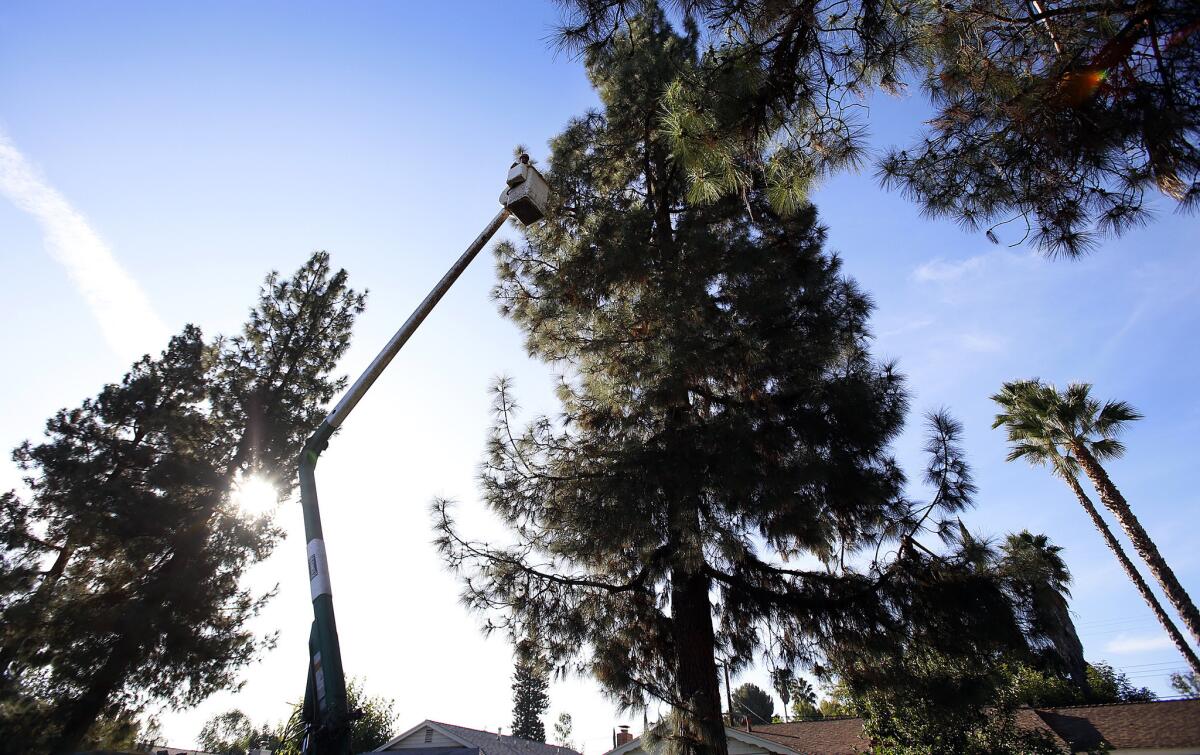$8.6-billion L.A. budget to fill 350,000 potholes, trim 57,000 trees

A city contractor uses a lift to trim a tree in the West Hills neighborhood of Los Angeles on Oct. 23, 2014.
- Share via
Los Angeles lawmakers unanimously voted Thursday for a nearly $8.6-billion budget plan that would boost funding for the Fire Department, tree trimming and street and alley cleanup while stashing more money in reserves.
At a Thursday hearing, Councilman Paul Krekorian said the budget for the 2015-16 fiscal year, which starts July 1, would allow the city to fill 350,000 potholes, trim 57,000 trees, preserve 2,400 lane-miles of pavement and hire 270 firefighters.
Krekorian heralded the budget as a sea change from the dire finances of years past, saying that city leaders had worked diligently to chip away at ongoing deficits by shrinking the city workforce, undertaking pension reform and finding other long-term savings.
But he warned that they should remain financially cautious: The upcoming budget does not account for any future raises that could be bargained with employee unions, many of which are locked in negotiations with the city. Budget deficits are still predicted for several years.
“While there’s much good news in this, there’s also reason to continue to be conservative, continue to be careful about what we do in our budget,” Krekorian said Thursday.
The plan is largely similar to the budget proposed last month by Mayor Eric Garcetti, which uses a modest boost in tax revenue to increase spending on public safety and city infrastructure. Revenues for the main day-to-day budget — the city general fund — have been estimated to rise roughly 5% over the previous year as the economy revives.
Garcetti thanked the council for working with him on the plan and praised it as “a back-to-basics budget that is balanced, sets our reserve fund at a record high, and makes the prudent investments we need for more services, infrastructure and jobs in Los Angeles.”
The budget approved Thursday includes $9 million for a Clean Streets Initiative to pick up trash and clean alleys, $20 million to fix sidewalks, an additional $55 million for the Fire Department, an added $10 million for affordable housing, and more than $4.5 million for body cameras for L.A. police officers, Krekorian said.
Council members also made tweaks to the Garcetti proposal, including adding $2 million to speed up the hiring process for city employees and providing $500,000 to reduce a fingerprinting backlog at the Police Department. They also restored millions in funding for community programs that were once covered by federal grants, including those that shelter people fleeing domestic violence, remove graffiti, assist people with HIV/AIDS, and help day laborers.
Councilman Mike Bonin said in a statement that the plan begins to restore neighborhood services and “spares several crucial programs that suffered crushing cuts in their federal support.”
That added spending will be paid for from an additional $50 million that was identified by city analysts after Garcetti made his initial budget proposal, including a revised, higher forecast for property taxes and money left unspent by city departments.
But the bulk of that added money went into reserve and budget stabilization funds, bringing the total of such reserves — already the highest amount and percent budgeted in the last two decades of city history, said City Administrative Officer Miguel Santana — even higher.
“We know that there will be an economic downturn,” Krekorian said in explaining why the council increased city reserves. “It’s only a question of when it occurs.”
Such reserves played a big role in plugging the budget gap this time around: The mayor proposed using $80 million in such funding to help close the originally projected deficit of $165 million for the coming fiscal year. (The amount of reserve money used ultimately totaled $56 million after the council’s changes.) But even with that transfer, officials said, reserves remained flush.
Firefighters union President Frank Lima praised the increased funding for the Fire Department, saying in a statement, “Mayor Garcetti and the City Council have shown that they understand the importance of our Fire Department and our dedicated first responders.”
The Fix LA Coalition, which includes labor unions and community groups, issued a statement from member Sheila Flory saying that the budget “finally takes a step in the right direction, but even with the new funding our city of Angels will be playing catch up for years to come.”
Budget officials say Los Angeles is on track to wipe out its year-over-year, or “structural,” deficit by mid-2018.
The budget plan approved Thursday will be formalized in a resolution that the council will vote on again before it goes to the mayor for final approval.
Follow @latimesemily for what’s happening at Los Angeles City Hall
More to Read
Sign up for Essential California
The most important California stories and recommendations in your inbox every morning.
You may occasionally receive promotional content from the Los Angeles Times.











